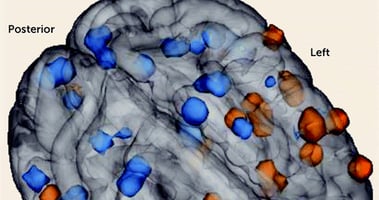A new biomarker may be on the horizon to more accurately identify psychiatric patients who may...
Researchers Identify, Validate Potential Serum Biomarker Panel for First-Onset Schizophrenia
 |
The researchers first conducted a meta-analysis of five independent cohorts comprising 331 first-onset drug-naive schizophrenia patients and controls to establish a diagnostic serum biomarker panel, which led to the identification of 26 biomarkers that best discriminated patients and controls. Next, they evaluated the diagnostic performance of the 26-analyte panel using samples from two independent cohorts comprising 93 patients diagnosed with first- or recent-onset schizophrenia and 88 controls, which yielded an area under the curve (AUC) of 0.97 (sensitivity=87%, specificity=97%, accuracy=93%) for schizophrenia detection. Lastly, the researchers tested the predictive performance of the panel before onset of psychosis using two cohorts of 445 pre-onset or at-risk individuals.
According to the authors, “The predictive performance achieved by the panel was excellent for identifying U.S. military personnel (AUC: 0.90 [0.86–0.95]) and help-seeking prodromal individuals (AUC: 0.82 [0.71–0.93]) who developed schizophrenia up to two years after baseline sampling. The performance increased further using the latter cohort following the incorporation of CAARMS (Comprehensive Assessment of At-Risk Mental State) positive subscale symptom scores into the model (AUC: 0.90 [0.82–0.98]).”
While the authors acknowledged that further validation studies using larger independent pre-onset sample sets are needed, they wrote, “[t]he biomarker panel presented here represents a validated set of biomarkers from which a definitive signature for diagnosis and prediction of schizophrenia in the clinical setting could be developed. Ultimately, further developments of the biomarker panel could form the basis of a low-cost blood test, which can complement DSM-5- or ICD-10-based diagnostic approaches.”
To read more about potential biomarkers for psychiatric illness, see the Psychiatric News article “Potential Biomarker for Suicide Vulnerability Identified.”
(Image: kao/Shutterstock.com)





